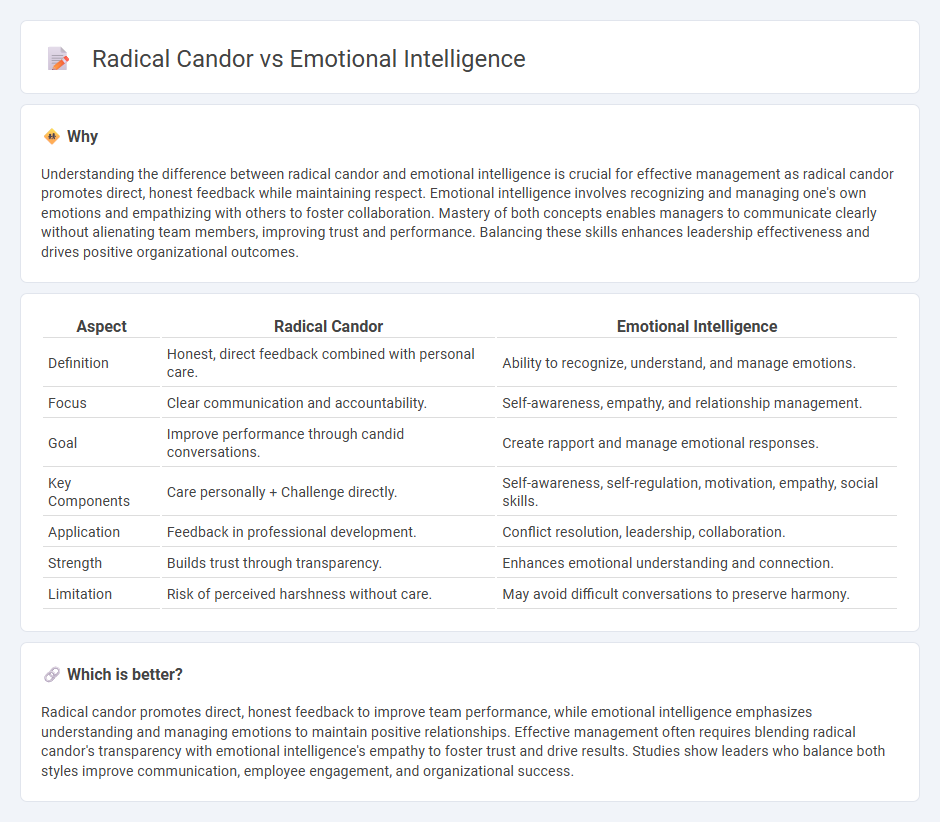
Radical Candor emphasizes direct, honest feedback to foster trust and improve team performance, while Emotional Intelligence focuses on understanding and managing emotions to enhance communication and relationships. These management approaches intersect by balancing assertiveness with empathy to create a productive workplace culture. Explore how integrating Radical Candor and Emotional Intelligence can transform leadership effectiveness.
Why it is important
Understanding the difference between radical candor and emotional intelligence is crucial for effective management as radical candor promotes direct, honest feedback while maintaining respect. Emotional intelligence involves recognizing and managing one's own emotions and empathizing with others to foster collaboration. Mastery of both concepts enables managers to communicate clearly without alienating team members, improving trust and performance. Balancing these skills enhances leadership effectiveness and drives positive organizational outcomes.
Comparison Table
| Aspect | Radical Candor | Emotional Intelligence |
|---|---|---|
| Definition | Honest, direct feedback combined with personal care. | Ability to recognize, understand, and manage emotions. |
| Focus | Clear communication and accountability. | Self-awareness, empathy, and relationship management. |
| Goal | Improve performance through candid conversations. | Create rapport and manage emotional responses. |
| Key Components | Care personally + Challenge directly. | Self-awareness, self-regulation, motivation, empathy, social skills. |
| Application | Feedback in professional development. | Conflict resolution, leadership, collaboration. |
| Strength | Builds trust through transparency. | Enhances emotional understanding and connection. |
| Limitation | Risk of perceived harshness without care. | May avoid difficult conversations to preserve harmony. |
Which is better?
Radical candor promotes direct, honest feedback to improve team performance, while emotional intelligence emphasizes understanding and managing emotions to maintain positive relationships. Effective management often requires blending radical candor's transparency with emotional intelligence's empathy to foster trust and drive results. Studies show leaders who balance both styles improve communication, employee engagement, and organizational success.
Connection
Radical candor, which combines direct feedback with genuine care, relies heavily on emotional intelligence to understand and manage both one's own emotions and those of others during communication. Leaders skilled in emotional intelligence can deliver honest critiques without damaging relationships, fostering trust and openness. This connection enhances team performance by promoting transparent dialogue while maintaining psychological safety.
Key Terms
Self-awareness
Emotional intelligence emphasizes self-awareness by helping individuals recognize and understand their own emotions, leading to better self-regulation and empathy in interpersonal interactions. Radical candor focuses on self-awareness through honest self-assessment and direct communication while caring personally for others, fostering trust and openness in professional environments. Explore the nuances of self-awareness in emotional intelligence and radical candor to enhance your leadership and communication skills.
Empathy
Emotional intelligence centers on recognizing, understanding, and managing one's own emotions while empathizing with others to foster meaningful connections. Radical candor combines direct honesty with genuine empathy to provide clear, constructive feedback without damaging relationships. Explore how integrating empathy in both approaches enhances leadership effectiveness and team dynamics.
Direct feedback
Emotional intelligence emphasizes delivering direct feedback with empathy, ensuring the recipient feels understood and valued while addressing performance issues. Radical Candor advocates for candid, straightforward communication paired with genuine care, promoting transparency and trust in professional relationships. Explore how blending these approaches can enhance your feedback effectiveness and foster a positive workplace culture.
Source and External Links
Emotional Intelligence - Emotional intelligence (EI) is the ability to perceive, use, understand, manage, and handle emotions, often linked to empathy and workplace performance.
Spotlight: What it means to be emotionally intelligent - Emotional intelligence is defined by attributes such as self-management and self-awareness, enabling constructive decision-making under stress.
What is emotional intelligence and how does it apply to the workplace? - Emotional intelligence involves managing one's emotions and understanding others', crucial for interpersonal skills and conflict management in the workplace.
 dowidth.com
dowidth.com